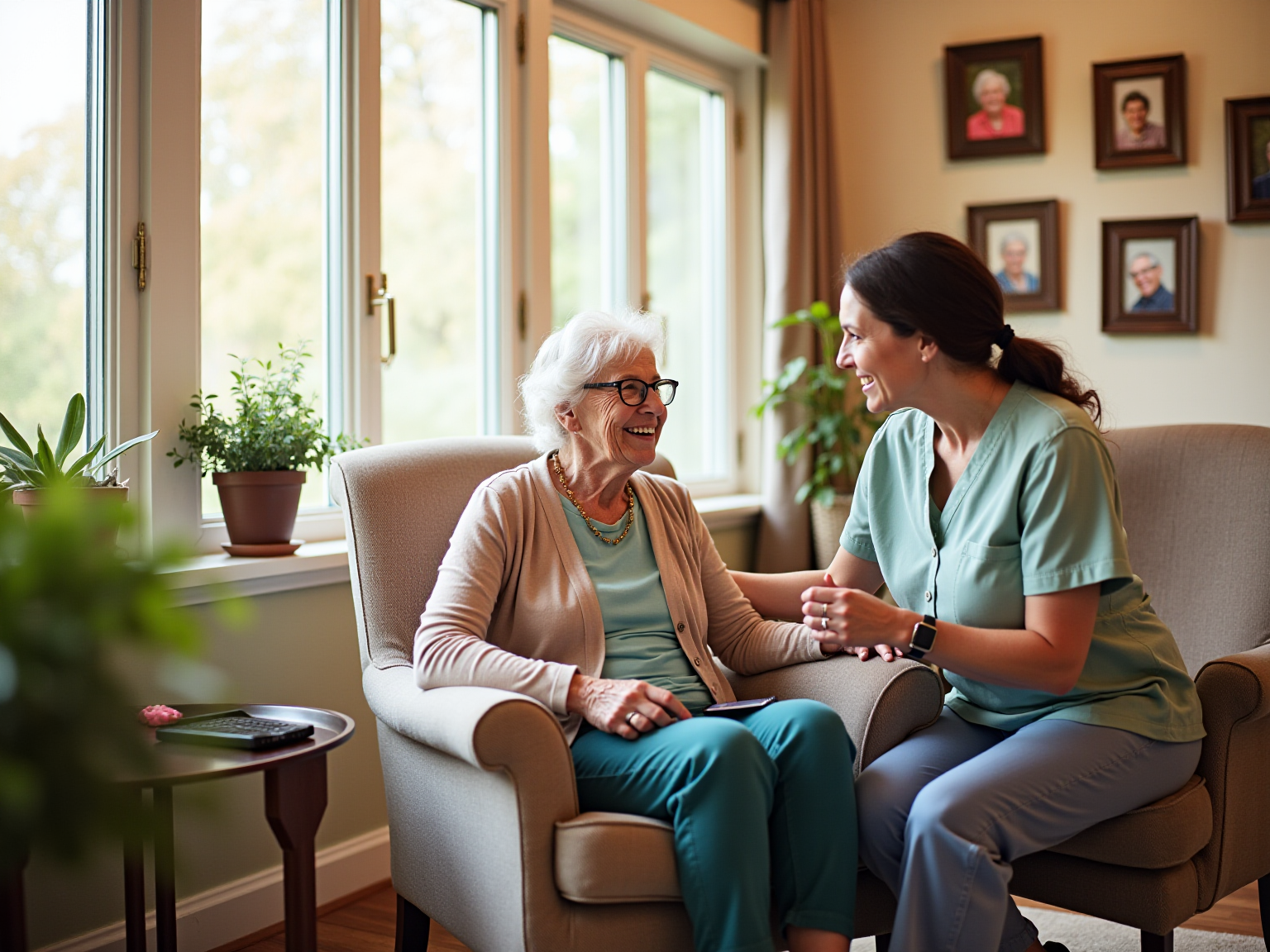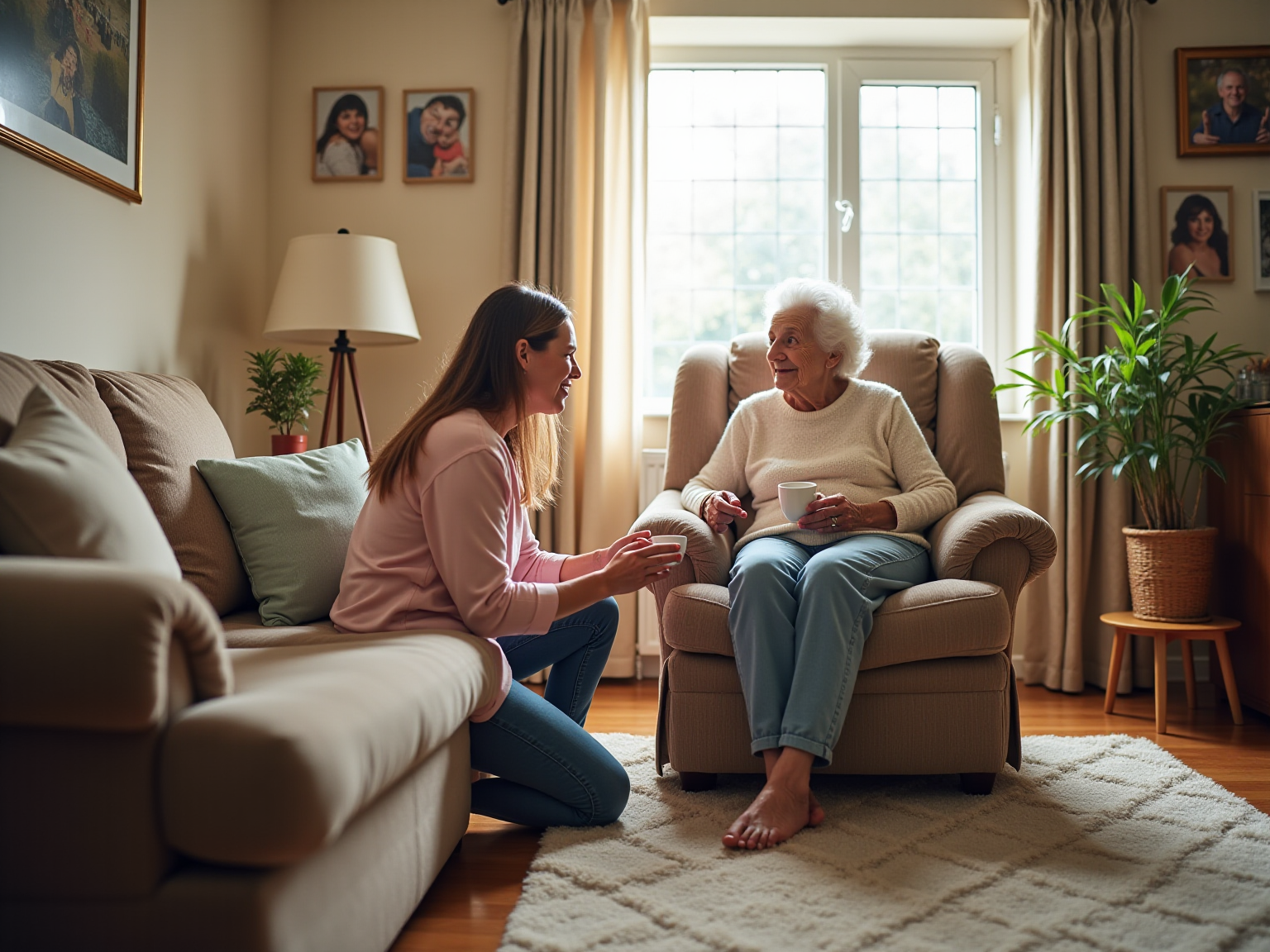Overview
Finding the right in-home elder care services can feel overwhelming, but you’re not alone in this journey. It’s essential to assess your loved one’s care needs, ensuring that their unique requirements are understood and met. Researching local providers is a crucial step, as it helps you discover the options available in your area.
Evaluating caregiver qualifications is equally important. You want to ensure that the caregivers are not only qualified but also compassionate and nurturing. By following these steps, you can select the right support tailored to your loved one’s needs, fostering both safety and emotional well-being in the comfort of their own home.
Remember, we’re here for you. Your comfort and peace of mind are our priorities, and by taking these steps, you can feel confident in the care your loved one will receive. Let’s work together to find the best solution for your family.
Introduction
Navigating the landscape of in-home elder care can feel overwhelming for families dedicated to providing the best support for their loved ones. With a wide array of options available—personal care, companionship, skilled nursing, and homemaker services—understanding the unique needs of seniors is essential. As the demand for these services continues to grow, the task of selecting the right care provider becomes increasingly complex.
This article explores key considerations for families, from assessing care needs and researching local providers to evaluating caregiver qualifications and understanding costs. By equipping themselves with the right information, families can make informed decisions that ensure their loved ones receive compassionate and personalized care in the comfort of their own homes. Remember, we’re here for you, and your comfort is our priority.
Understand In-Home Elder Care Options
In-home elder care near me encompasses a diverse range of services tailored to assist seniors in their daily lives, enabling them to remain in the comfort of their own homes. The primary types of in-home assistance include:
-
Personal Care: Assistance with daily activities such as bathing, dressing, and grooming, ensuring seniors maintain their hygiene and dignity. This support is crucial for preventing health complications related to poor personal hygiene.
-
Companionship: Caregivers provide essential social interaction and emotional support, helping to alleviate feelings of loneliness and isolation, which are prevalent among seniors. This companionship can significantly enhance emotional well-being and reduce the risk of depression.
-
Skilled Nursing Services: Registered nurses (RNs) or licensed practical nurses (LPNs) provide medical assistance, including medication management and wound treatment, addressing the health needs of seniors effectively. Proper medical monitoring is vital to prevent health declines and manage chronic conditions.
-
Respite Assistance: This support provides short-term relief for main providers, enabling them to take essential breaks while guaranteeing their loved ones receive quality attention. This flexibility is essential for maintaining the well-being of both seniors and their caregivers.
-
Homemaker Services: Assistance with household tasks such as cleaning, cooking, and laundry, which helps seniors maintain a clean and safe living environment. This assistance lowers household risks and encourages a more secure living environment.
Recent trends suggest that around 89% of patients show contentment with home health services, emphasizing the efficacy of these support models, particularly in the realm of in-home elder assistance. As of 2025, around 26% more caregivers than non-caregivers report facing substance abuse challenges, underscoring the importance of support systems for caregivers. Furthermore, the demographic profile indicates that the average inhabitant of an assisted living facility is an 85-year-old female, highlighting the increasing demand for customized in-home support solutions for this age group. Significantly, special-needs children account for 29% of recipients, demonstrating the variety of support requirements that in-home elder care near me must address. Comprehending these different services is essential for families pursuing the appropriate assistance for their loved ones, guaranteeing that their unique needs are fulfilled with empathy and professionalism. Moreover, insights from the demographics of home support workers can help families understand the workforce dynamics that influence the quality of assistance provided, highlighting the significance of selecting the appropriate in-home support options.
Call to Action: If you are contemplating in-home assistance for your loved one, reach out to Best Care Nurses Registry today to explore how we can offer personalized support that is both effective and economical compared to institutional services.

Assess Your Loved One’s Care Needs
To effectively assess your loved one’s care needs, it’s important to follow these essential steps:
-
Evaluate Daily Living Activities: Begin by identifying which activities your loved one can perform independently and which require assistance. Key areas often include bathing, dressing, eating, and mobility. Notably, approximately 6.4% of older adults report limitations in using a toilet, highlighting the prevalence of challenges in daily living activities. Many middle-aged and older adults face difficulties with activities of daily living (ADLs), underscoring the importance of thorough assessments. Indicators suggesting the need for in-home elder care near me include difficulty with personal hygiene, dressing, cooking, cleaning, or managing medications. CNAs (Certified Nursing Assistants) generally undergo comprehensive training centered on medical duties, while HHAs (Home Health Aides) are prepared to help with personal assistance and daily living activities.
-
Consider Medical Needs: It’s crucial to identify any medical conditions that require specialized assistance, such as diabetes management or physical therapy. Understanding these needs ensures appropriate support. Health issues, like managing chronic conditions, frequent hospital visits, or recent surgeries that necessitate ongoing attention, are also significant factors to consider.
-
Assess Cognitive Function: Evaluate their mental health and cognitive abilities. Conditions like dementia may require more specialized care, emphasizing the importance of tailored support for cognitive challenges.
-
Review Social Needs: Consider their social interactions and emotional well-being. Companionship plays a significant role in overall happiness, and addressing social requirements can greatly enhance quality of life. Signs of social isolation, like loneliness or withdrawal, may suggest a need for companion or sitter services. It’s important to note that nearly 5.6 million older adults lived below the poverty line in 2022, which can exacerbate feelings of isolation and stress.
-
Involve Your Loved One: Engage them in discussions about their needs and preferences. This involvement honors their autonomy and encourages a sense of control over their treatment choices. As Howard E. LeWine, MD, states, “The same holds for physical planning: the earlier you start, the more likely you are to live independently in your later years.”
-
Maintain Communication: Ensure open lines of dialogue with support providers and home assistance organizations. Frequent check-ins with your loved one and the caregiver can help resolve any issues quickly and guarantee quality support.
By performing a comprehensive evaluation, you can form a clear understanding of the support, such as in-home elder care near me, that will best assist your loved one, ensuring they receive the compassionate and individualized help they deserve. Considering the anticipated growth in the population of Americans aged 85 and above, which is predicted to expand from 6.7 million in 2020 to 14.4 million by 2040, the demand for customized healthcare is more crucial than ever.
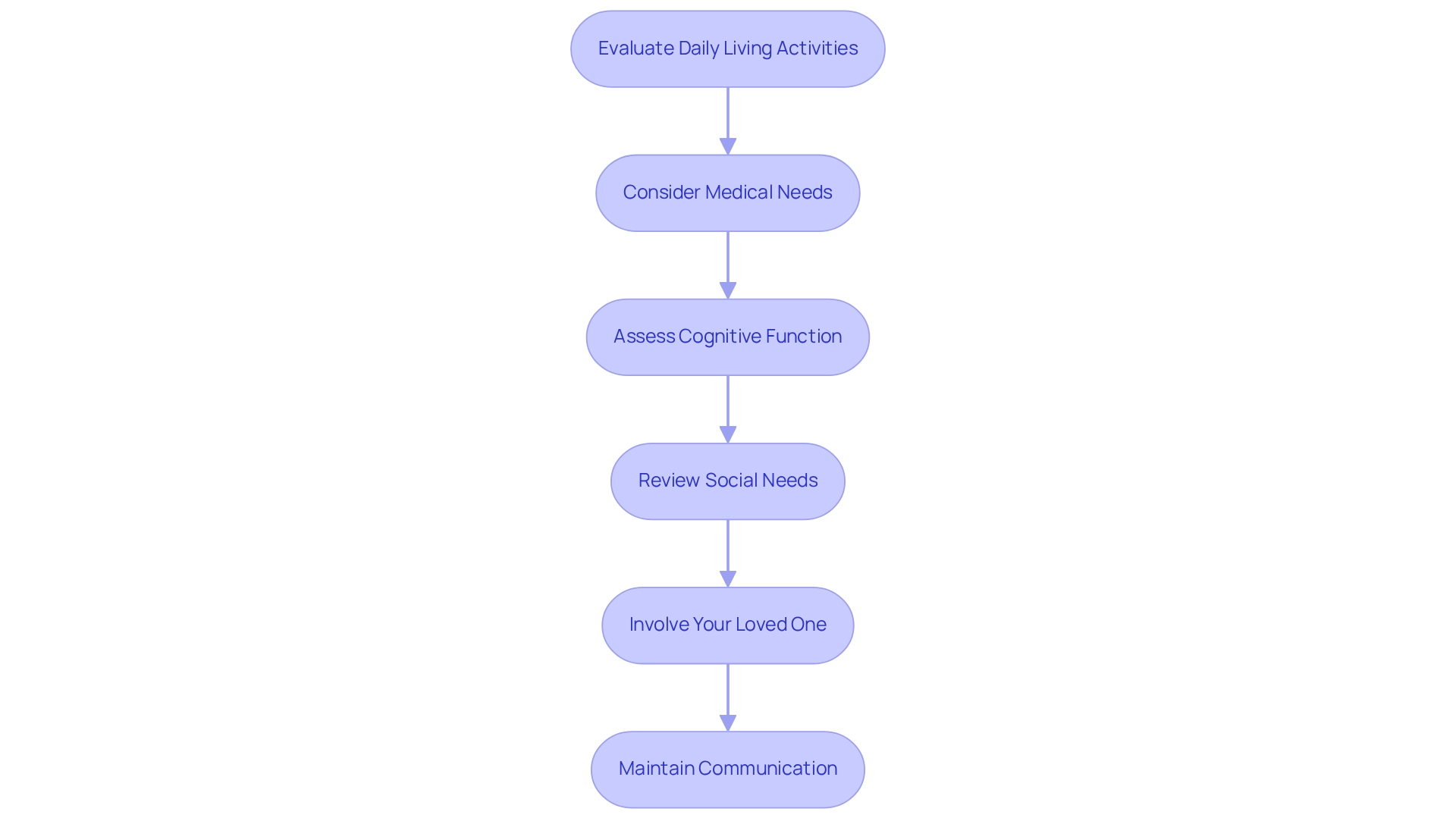
Research Local In-Home Care Providers
When considering in-home elder care near me, it’s essential to take steps that ensure you find the best fit for your loved one.
-
Utilize Online Resources: Begin by leveraging platforms like Eldercare Locator and Care.com. These resources can help you discover local agencies and access reviews from other families, providing valuable insights. Many families rely on online information to make informed decisions, with statistics indicating that 12 million individuals in the U.S. currently receive home health assistance services. This highlights the growing need for professional caregivers, especially in-home elder care near me; don’t hesitate to consult friends, family, or healthcare professionals for referrals to trusted providers. Personal suggestions often lead to discovering reliable support options that have proven effective for others.
-
Check Credentials: It’s crucial to verify that the agency is licensed and accredited. Confirming their standing with local health departments or regulatory bodies ensures compliance with industry standards, giving you peace of mind.
-
Read Reviews: Investigate testimonials and reviews online to understand the experiences of other families with the provider. For instance, at Best Care Nurses Registry, clients have praised team members like Brianna, who ensures that all home support needs are met, and Sherie, who excels at matching clients with suitable attendants. Such feedback can provide valuable insights into the quality of service offered.
-
Interview Potential Providers: Organize discussions with multiple agencies to explore their services, staff qualifications, and overall approach to support. This step is vital in evaluating compatibility and ensuring that the agency aligns with your loved one’s specific needs. At Best Care, caregivers like Lucinda and Jacque bring extensive experience and a personal touch to their roles, enhancing the overall service experience. At Best Care, CNAs and HHAs provide in-home elder care near me, assisting with daily living activities, medication management, and companionship to ensure comprehensive support for seniors. It’s important to recognize that one in four adults over the age of 65 experiences a fall each year. This statistic underscores the necessity for reliable in-home elder care near me to ensure safety and support. Choosing a provider like Best Care Nurses Registry, which prioritizes quality services, can significantly enhance your loved one’s well-being and independence. Remember, we’re here for you, and your comfort is our priority.
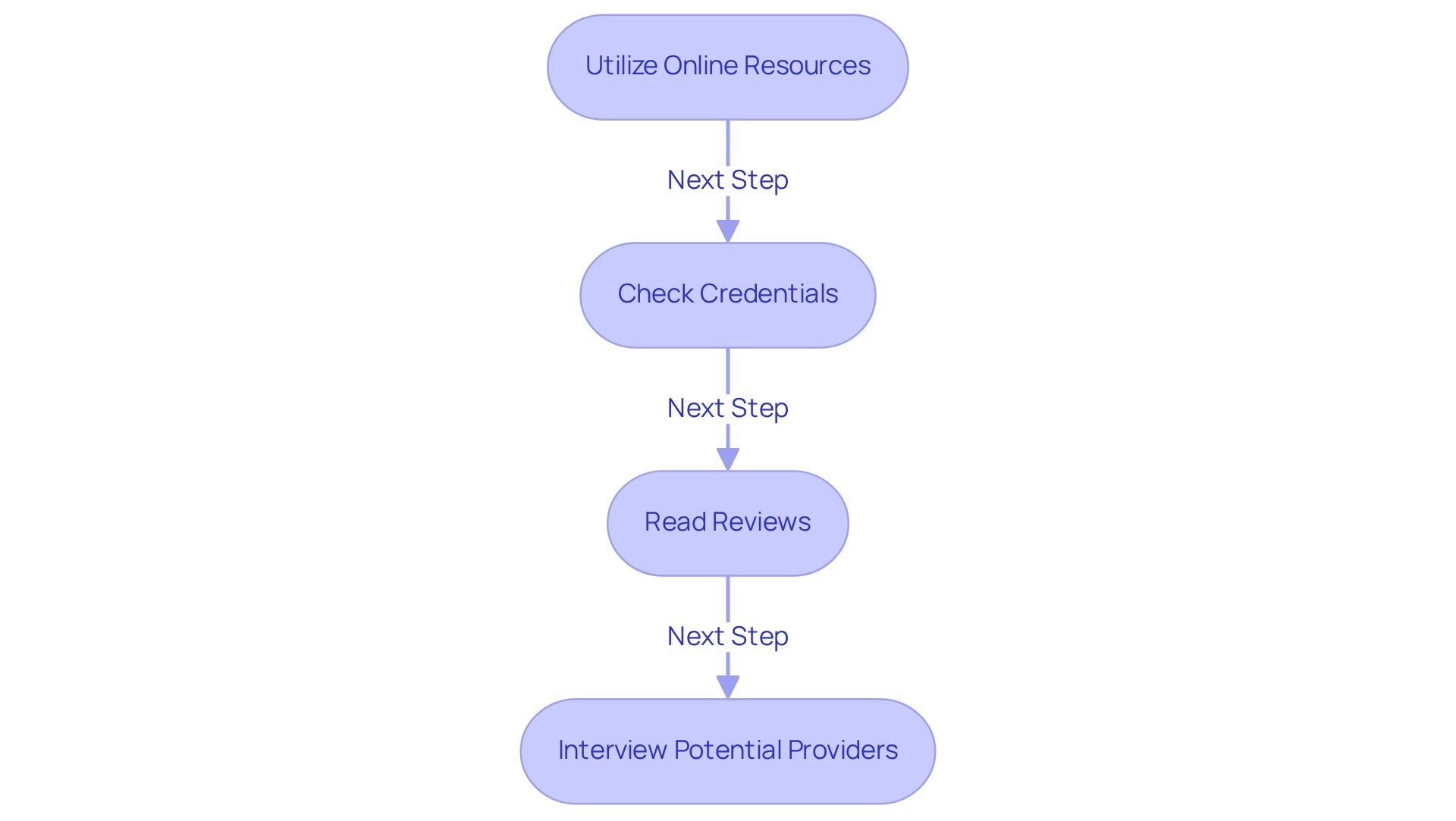
Evaluate Caregiver Qualifications and Compatibility
To effectively assess provider qualifications and compatibility, consider the following steps:
-
Check Qualifications: Confirm that the individual possesses essential certifications, such as CPR and first aid, along with relevant experience in senior support. This foundational knowledge is crucial for ensuring safety and effective care, especially when managing chronic conditions or assisting with daily living activities.
-
Conduct Background Checks: It is crucial to ensure that the agency performs thorough background checks on their personnel. Research indicates that a significant percentage of agencies prioritize this practice, enhancing safety and reliability for families. In fact, statistics show that around 80% of agencies conduct thorough background checks, which is essential for peace of mind.
-
Assess Compatibility: During interviews, observe how the provider interacts with your loved one. Look for qualities such as empathy, patience, and understanding, which are essential for fostering a supportive environment. The caregiving journey is characterized by love, respect, patience, and strength, making compatibility a key factor in successful care.
-
Discuss Care Plans: Engage possible support providers in a conversation about their approach to care. Ask about their strategies for tackling particular requirements, such as personal hygiene, meal preparation, and medication management, which can disclose their readiness and flexibility.
-
Trial Period: If possible, organize a trial phase to assess the provider’s interaction with your loved one. This allows both parties to evaluate compatibility before making a long-term commitment.
-
Identify Indicators for Care Needs: Look for signs that suggest the need for CNA/HHA services, such as difficulty with personal hygiene, dressing, cooking, cleaning, or managing medications. Health issues such as handling long-term ailments or repeated hospital visits are also vital indicators.
By carefully assessing qualifications and suitability, families can obtain a support provider who not only fulfills professional requirements but also improves the quality of life for seniors. A case study emphasizes that home care providers significantly enhance personal hygiene and overall health, highlighting the importance of a good match in maintaining dignity and well-being. Furthermore, it is estimated that the value of family support providers’ services is around $306 billion each year, emphasizing the critical role they play in the healthcare system. Additionally, 22% of family supporters indicate requiring assistance in communicating with physicians, underscoring the significance of choosing a qualified individual who can help in these interactions. CNAs (Certified Nursing Assistants) usually undergo more comprehensive training centered on medical responsibilities, whereas HHAs (Home Health Aides) concentrate more on personal support and daily living tasks. Maintaining open communication with the caregiver and the home support agency is vital for ensuring quality assistance.
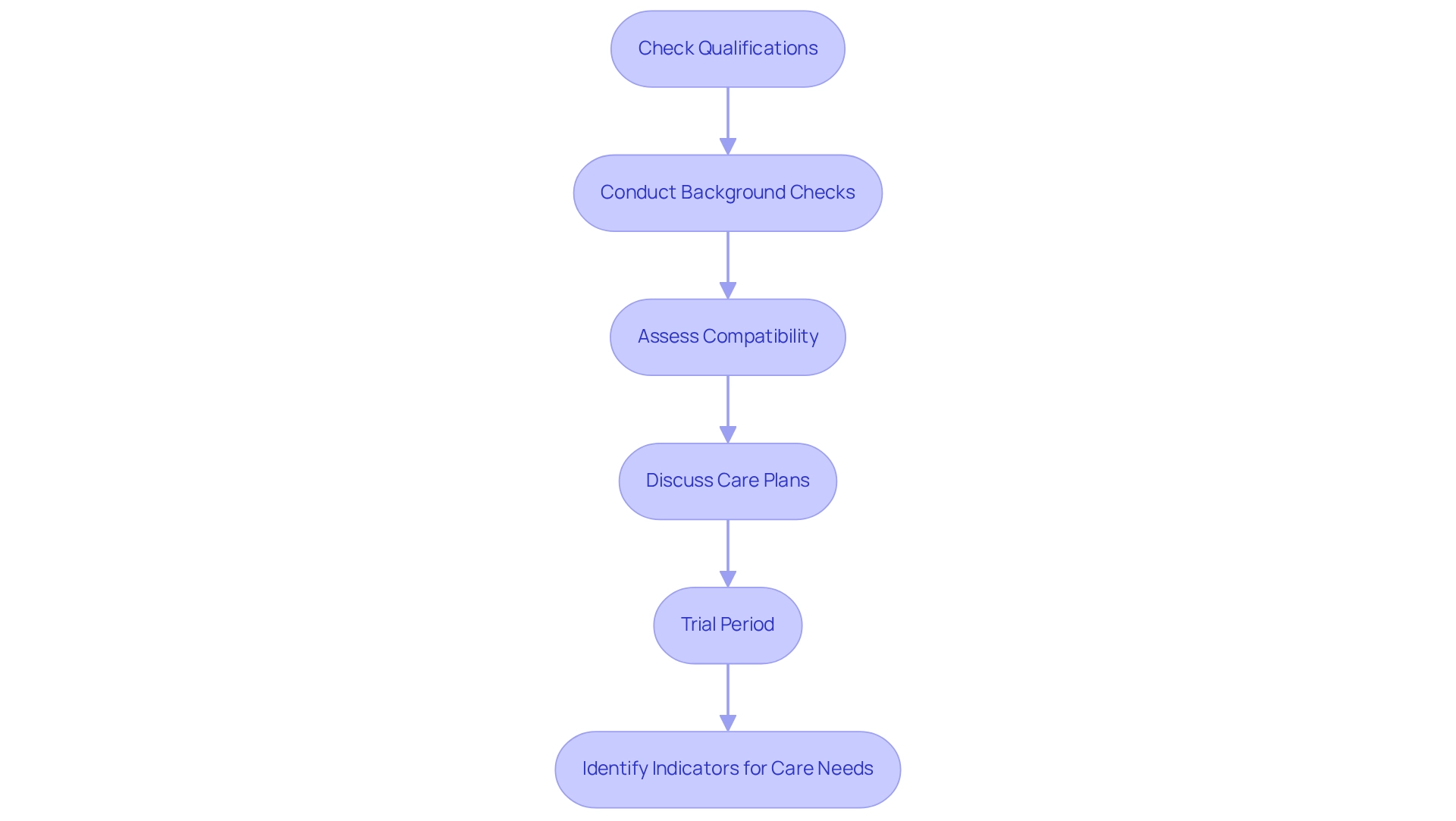
Consider Costs and Insurance Options
When assessing expenses and insurance choices for in-home elder care near me, it’s essential to consider a few key guidelines that can help ease your concerns:
- Understand Pricing Models: In-home elder care near me typically charges on an hourly, daily, or monthly basis. In South Florida, the average hourly rates for in-home assistance in 2025 range from $20 to $50, reflecting the growing demand for skilled workers in this field. Notably, two-thirds of home support agencies surveyed now charge the same rate for both home health aides and homemakers, providing valuable context for understanding pricing models.
- Explore Insurance Coverage: Investigate whether your loved one’s health insurance, Medicare, or Medicaid includes any options for in-home elder care near me. Approximately 60% of seniors are covered by Medicare for specific home health assistance, which can significantly reduce expenses. However, it’s important to remember that Medicare does not cover assistance with activities of daily living, such as bathing, grooming, and meal preparation, which private duty caregivers provide. Long-term support insurance may cover these essential services, and Best Nurses Registry accepts most long-term support insurances directly on your behalf, simplifying the payment process for in-home elder care near me.
- Discuss Payment Options: Inquire about payment plans or sliding scale fees that agencies may offer for in-home elder care near me to accommodate various financial situations. Many agencies are adapting to the needs of families by providing flexible payment structures. At Best Care, we assist in completing the necessary paperwork, such as the assignment of benefits (AOB), to facilitate direct payments from your insurance carrier.
- Explore Financial Assistance Programs: Look into local and state initiatives that offer financial support for seniors needing in-home elder care near me. These programs can bridge the gap for families facing financial constraints, ensuring that your loved one receives the care they need.
- Budget for Additional Costs: Be mindful of potential additional expenses, such as transportation or specialized equipment, when planning your budget. These costs can accumulate and should be factored into your overall financial planning to avoid any surprises.
- Evaluate Alternatives: For individuals who find in-home services costs prohibitive or who require higher levels of assistance, options such as nursing homes and assisted living facilities are available. Nursing homes provide round-the-clock assistance at a median price of $290 daily, a crucial consideration for families when reviewing their options.
By carefully evaluating expenses and insurance possibilities, you can ensure that your loved one receives the necessary support while alleviating financial pressure. As Scott Witt, Managing Partner of Select Home Care, emphasizes, understanding these factors is vital for families to make informed choices regarding the well-being of their loved ones.
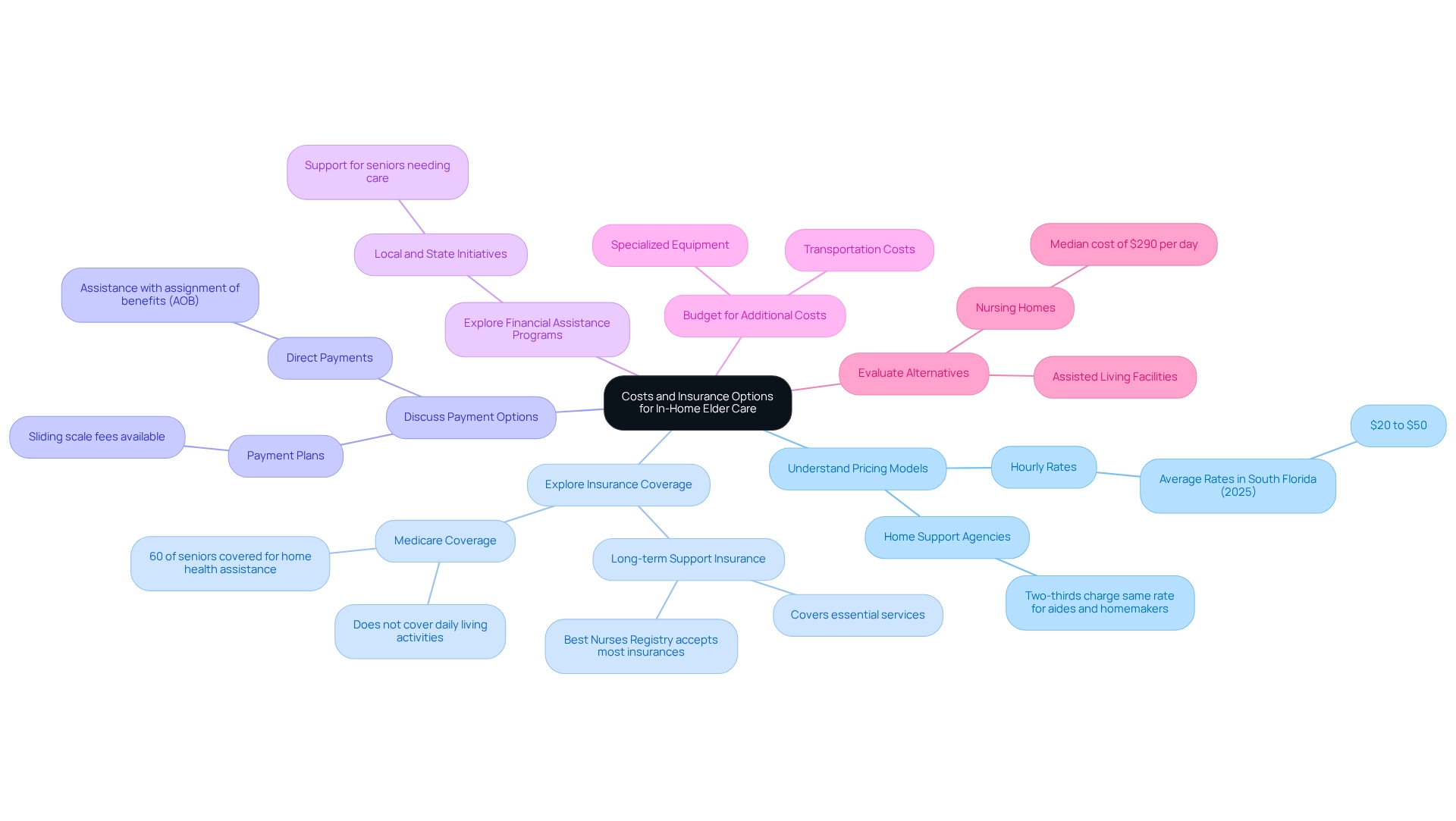
Make an Informed Decision and Finalize Care
To make an informed decision and conclude assistance, please follow these essential steps:
-
Review All Information: Take the time to thoroughly examine assessments, research findings, and caregiver evaluations. This ensures that all relevant aspects have been considered, giving you peace of mind.
-
Discuss with Family: Involve family members in the decision-making process. Collecting varied viewpoints fosters agreement on the selected support strategy. Considering that 31% of individuals receiving assistance who are not in assisted living or skilled nursing facilities live alone, family participation is crucial for creating a comprehensive and beneficial support plan.
-
Engage with the Selected Provider: Clearly express your loved one’s specific preferences and requirements to the chosen agency or support person. This ensures they can adequately fulfill those criteria. At Best Care Nurses Registry, our welcoming team is ready to discuss your needs and assist in developing a customized in-home elder care near me service that suits your circumstances. Call (888) 203-2529 to speak with us today.
-
Set Clear Expectations: Define clear expectations regarding the individual’s responsibilities, schedule, and communication methods. This fosters a productive relationship. Our customized support matching system guarantees that you receive empathetic in-home elder care near me, specifically tailored to your loved one’s needs.
-
Identify the Need for CNA/HHA Services: Assess whether your loved one requires CNA/HHA caregiver services by evaluating their ability to perform daily activities and overall health status. Key indicators include:
- Difficulty with personal hygiene
- Challenges in dressing
- Issues with cooking or meal preparation
- Trouble managing medications
-
Finalize Agreements: Once you are satisfied with the arrangements, finalize any contracts or agreements with the provider, ensuring all terms are explicitly outlined.
By adhering to these steps, families can confidently establish care arrangements that effectively support their loved one’s needs, ultimately enhancing their quality of life. Remember, we’re here for you, and your comfort is our priority.
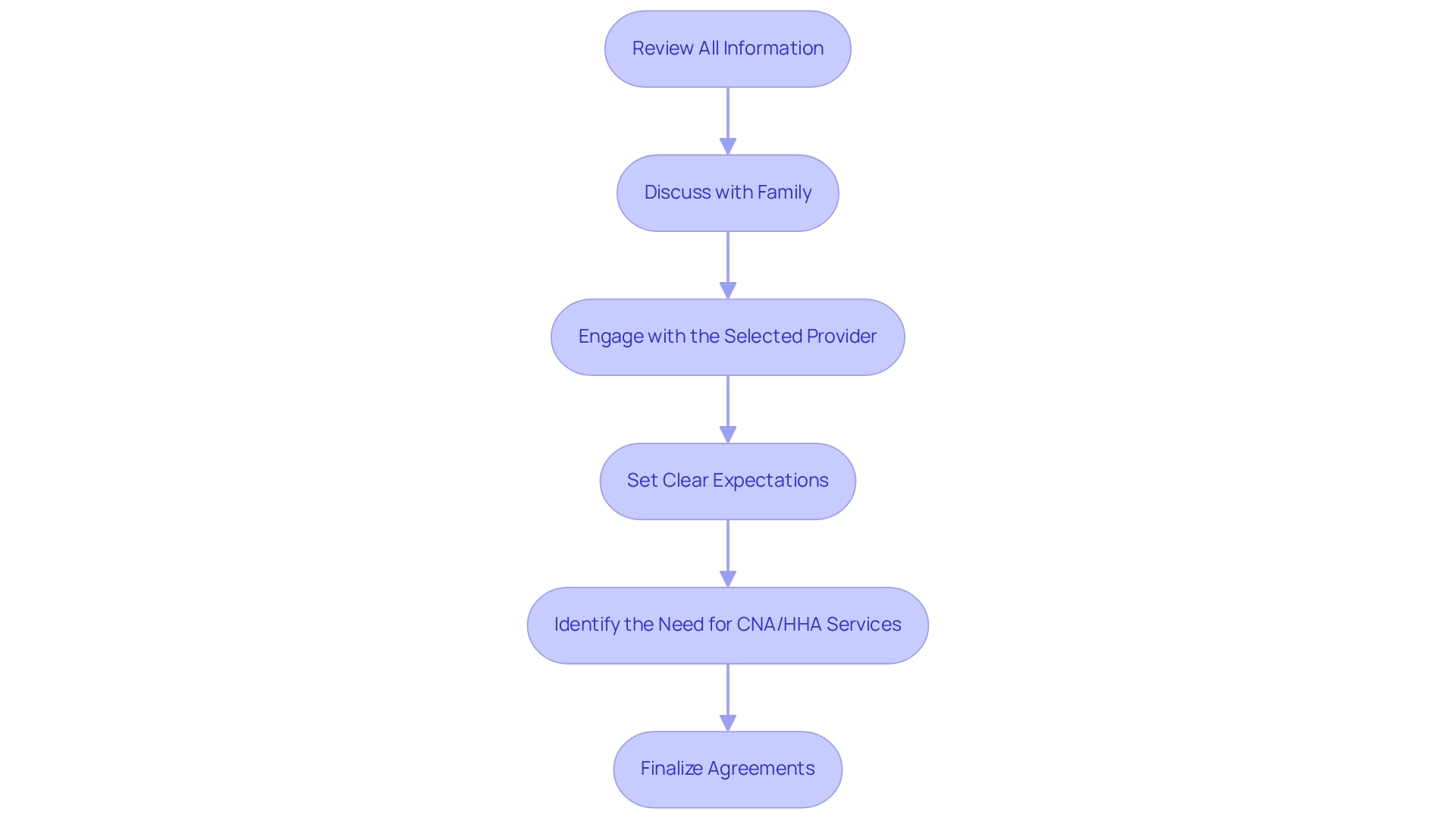
Conclusion
Navigating the complexities of in-home elder care is a critical undertaking for families dedicated to ensuring the well-being of their loved ones. Understanding the various types of in-home care services available—ranging from personal assistance to skilled nursing and companionship—allows families to tailor their approach to meet the specific needs of seniors. Assessing care requirements by considering daily living activities, medical needs, cognitive abilities, and emotional well-being forms the foundation for selecting appropriate services.
Researching local care providers empowers families to make informed decisions. Utilizing online resources, seeking recommendations, and interviewing potential agencies are vital steps in identifying a suitable caregiver. Evaluating caregiver qualifications and compatibility ensures that the chosen individual not only possesses the necessary skills but also aligns with the senior’s personality and preferences, fostering a supportive environment.
Financial considerations are equally important. Families need to explore insurance options and understand the costs associated with in-home care. By being proactive in assessing these factors, families can mitigate financial stress while providing essential support for their loved ones.
Ultimately, the goal is to create a care plan that enhances the quality of life for seniors while respecting their independence and dignity. By following these comprehensive steps—reviewing information, engaging family members, and communicating effectively with care providers—families can confidently finalize arrangements that prioritize compassionate and personalized care. In-home elder care is not just about meeting physical needs; it’s about nurturing emotional connections and ensuring that seniors feel valued and supported in their own homes.
Frequently Asked Questions
What types of services are included in in-home elder care?
In-home elder care includes personal care, companionship, skilled nursing services, respite assistance, and homemaker services. These services assist seniors with daily activities, provide emotional support, manage medical needs, offer caregiver relief, and help with household tasks.
How does personal care benefit seniors?
Personal care provides assistance with daily activities such as bathing, dressing, and grooming, which helps seniors maintain hygiene and dignity, preventing health complications related to poor personal hygiene.
What role does companionship play in elder care?
Companionship offers essential social interaction and emotional support to seniors, helping to alleviate feelings of loneliness and isolation, thereby enhancing emotional well-being and reducing the risk of depression.
What are skilled nursing services in the context of in-home elder care?
Skilled nursing services involve registered nurses (RNs) or licensed practical nurses (LPNs) providing medical assistance, including medication management and wound treatment, which are crucial for addressing the health needs of seniors.
What is respite assistance and why is it important?
Respite assistance provides short-term relief for primary caregivers, allowing them to take necessary breaks while ensuring their loved ones receive quality attention, which is vital for the well-being of both seniors and caregivers.
What do homemaker services entail?
Homemaker services include assistance with household tasks such as cleaning, cooking, and laundry, helping seniors maintain a clean and safe living environment, which reduces household risks.
What trends are observed in patient satisfaction with home health services?
Recent trends indicate that around 89% of patients express contentment with home health services, highlighting the effectiveness of in-home elder assistance models.
How is the demographic profile of seniors in need of care changing?
The average resident of an assisted living facility is an 85-year-old female, and there is an increasing demand for customized in-home support solutions for this age group. Additionally, special-needs children account for 29% of recipients of in-home elder care.
What steps should be taken to assess a loved one’s care needs?
To assess care needs, evaluate daily living activities, consider medical needs, assess cognitive function, review social needs, involve the loved one in discussions, and maintain communication with support providers.
Why is it important to involve the loved one in care discussions?
Involving the loved one in discussions about their needs and preferences honors their autonomy and encourages a sense of control over their treatment choices, which is essential for their overall well-being.
What is the significance of maintaining communication with caregivers and support providers?
Maintaining open lines of communication ensures quick resolution of any issues and guarantees quality support for the loved one receiving care.



